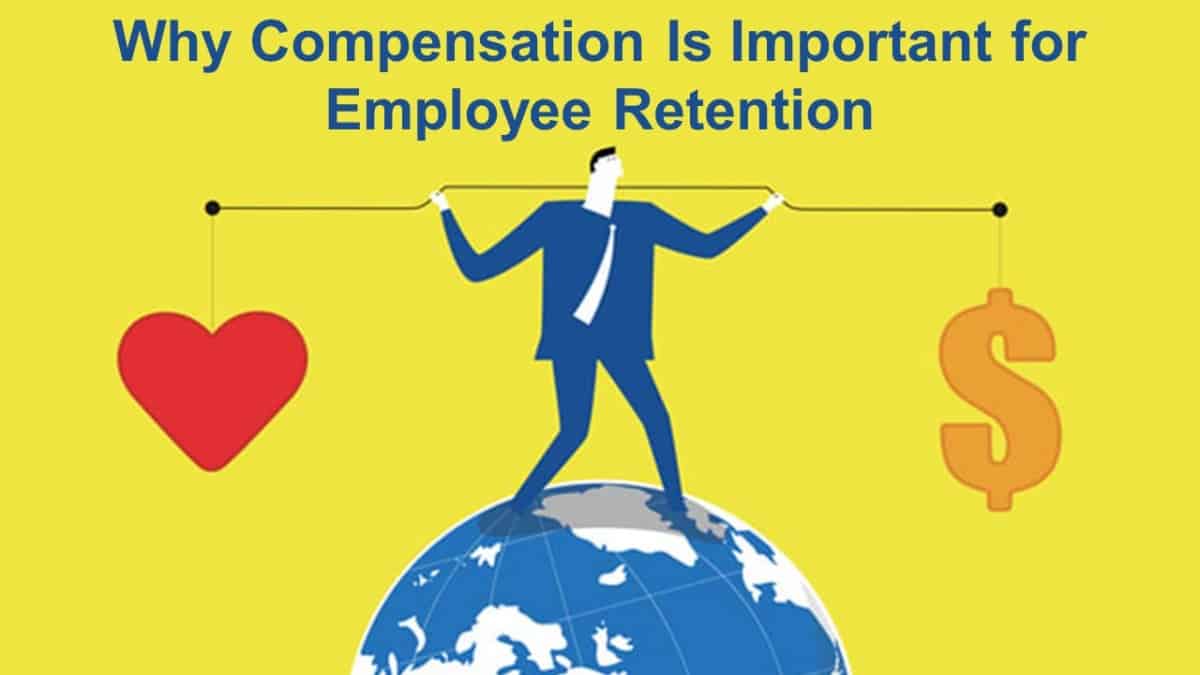Share:

“The Great Resignation” has had a tremendous impact on retention and worker expectations. It’s reported that a record 4.5 million U.S. workers left their jobs in November 2021.
This trend hasn’t just been confined to the U.S. Research has revealed that 12% of workers around the globe quit their jobs in 2021 and an additional 20% are expected to change jobs in 2022.
Compensation has always been one of the main reasons employees change jobs, and, while other factors are certainly contributing to an increase in turnover these days, compensation, including salaries and benefits, is still the main driver of turnover.
The competitiveness of the current job market has given workers more leverage when it comes to pay and benefits. Leaders considering whether or not they can and will meet the demands of workers should be aware of just how important compensation is to holding onto talented employees.
Compensation is important for employee retention because it helps companies avoid the high costs associated with turnover. Competitive compensation packages also help organizations attract and keep top talent and can lead to greater employee satisfaction, making it more likely employees will stay.
In this article, we’ll look at the important role compensation plays in retention and provide some compensation practices and strategies that will help your organization retain the best employees.


What Goes Into a Compensation Package
Compensation includes the salaries, wages, benefits, bonuses, and incentives provided to employees by employers in exchange for the work they do. Group health insurance coverage, short-term disability insurance, and retirement contributions are often part of a total compensation package.
Compensation plays a major role in acquiring talented employees and driving productivity. The quality of compensation packages determines the quality of an organization’s employees, how well they perform, and whether or not they are engaged in the work they do.
There are certain legal requirements and internal and external compliance standards that basic compensation packages must meet, but attracting and retaining skilled, high-performing, engaged employees requires competitive compensation and benefits packages that go beyond those that meet the minimum legal requirements.
Paid leave, wellness programs, flexible working schedules, stock options, remote and hybrid work alternatives, and other employee perks are additional benefits offered in competitive compensation packages.
Compensation and Retention
One of the most important benefits organizations can expect to result from offering employee-focused compensation programs is high rates of retention.
And retention is certainly a hot topic at the moment due to the high number of employees who are quitting their current jobs for other positions or exiting the job market altogether.
According to a report by Lattice, compensation is the main driver of employee turnover, with 55% of employees quitting to take jobs with higher compensation.
In fact, studies abound showing a direct link between competitive compensation offerings and higher rates of retention.
Recent research by Harvard University revealed that increasing pay among warehouse workers by just one dollar per hour resulted in a 2.8% retention boost. Results also showed that every dollar per hour pay loss caused a 28% increase in turnover.
Many employees who are leaving their jobs are seeking a better work-life balance, professional development opportunities, jobs that offer remote or hybrid work options, and jobs that will provide them with a greater sense of purpose.
While employees are definitely seeking less tangible benefits in their job searches these days, compensation remains a key factor in engaging and retaining employees because it satisfies their most basic needs.
When employees’ needs are met, they are more likely to stay with an organization. Being well-compensated, through pay, benefits, and other employee perks, for the work they do motivates employees to do their work well.
When an organization lacks a good compensation package, or any compensation package, it can significantly affect employee engagement, productivity, performance, and profitability. Without decent compensation, employees will not feel valued or appreciated by the organization. As a result, they will likely not be satisfied in their roles.
This can create an unpleasant work environment where morale is low, disengagement is high, and employees feel little commitment to the organization. It can also lead to low productivity, poor customer service, and decreased customer retention.


Why Retention Matters
Retention refers to a company’s ability to retain employees. High rates of retention are the result of reducing employee turnover, which refers to the number of employees who leave a job during a certain time period, either voluntarily or involuntarily.
Employee retention significantly impacts the performance, profitability, and long-term success of organizations because it is more efficient to retain qualified employees than to train and onboard new hires. Additionally, employee retention programs play an important role in attracting and retaining talented, highly-skilled employees when jobs are open.
Turnover was the top workforce management challenge cited by 47% of human resource professionals in the SHRM/Globoforce survey Using Recognition and Other Workplace Efforts to Engage Employees.
High retention rates can indicate a high level of engagement, superior performance, and better customer service. Engagement is particularly important as employees who care more about an organization’s mission feel a sense of purpose in their roles and will perform better.
High rates of retention mean lower rates of turnover—which is important because the cost of turnover can have a devastating effect on a company’s bottom line. It has been reported that turnover costs companies, on average, six to nine months of an employee’s salary to replace them.
On top of the high cost of turnover, the time and effort managers have to spend on recruitment makes it harder for them to focus on other aspects of their roles and continue developing their current staff.
When retention is high, this allows managers to spend less time and effort on the recruitment process and more time on helping employees thrive.
High turnover can also hurt employee morale. Employees may feel overworked due to the increased workloads and responsibilities that turnover causes and feel that they are being underpaid for the hours they are putting in.
The absence of less tangible types of compensation, like flexibility, remote and hybrid work options, and work-life balance, which are becoming increasingly important to job seekers, can also contribute significantly to turnover and poor morale.
When weighing the pros and cons of enhancing their compensation packages, organizations that understand the true costs of high turnover and the benefits of high retention know that a competitive compensation package will offer a good mix of tangible and intangible benefits that meet employee needs.
These good compensation strategies will provide benefits that meet not only employee needs, but also the needs of the organization. Sustainable compensation packages that keep pace with employee needs will ensure a work environment that is sustainable for employees well into the future.

Matt Tenney has been working to help organizations develop leaders who improve employee engagement and performance since 2012. He is the author of three leadership books, including the groundbreaking, highly acclaimed book Inspire Greatness: How to Motivate Employees with a Simple, Repeatable, Scalable Process.
Matt’s ideas have been featured in major media outlets and his clients include numerous national associations and Fortune 500 companies.
He is often invited to deliver keynote speeches at conferences and leadership meetings, and is known for delivering valuable, actionable insights in a way that is memorable and deeply inspiring.


